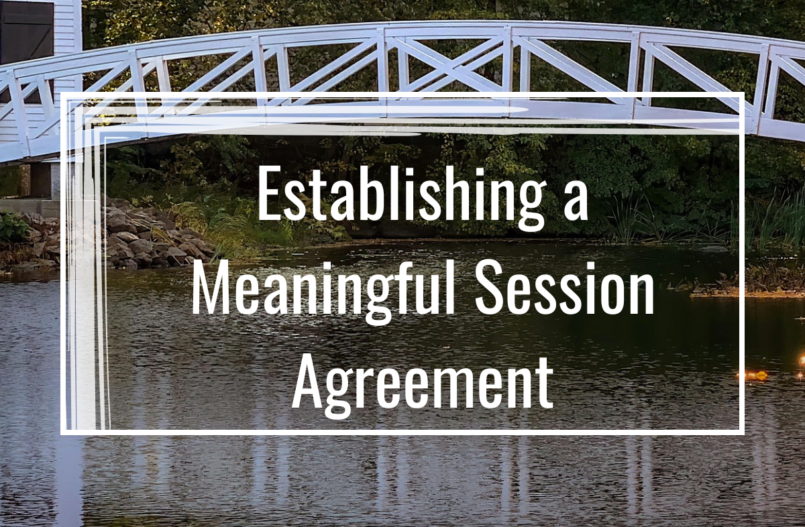As a coach trainer and mentor, who listens to dozens of coaching sessions each year, I know how many questions coaches have about Establishing a Coaching Agreement and defining a meaningful session goal.
This is part of ICF Core Coaching Competency 3: Establishes and Maintains Agreements.
Some of my recent mentoring sessions served as an inspiration for this blog.
Situation
Coach says,
“I have a feeling that my coaching agreement sounds superficial. The conversation ends too quickly. The client easily finds the action steps, and I have the feeling that we do not focus on the right thing. All the actions seem to be at a surface level. I hope the client can experience a mindset change, not find a temporary solution.”
In what the coach shared, I see a few topics that can lead to a rich discussion on various aspects of coaching. In this blog, I will only focus on one of them – establishing a coaching agreement and defining a meaningful session goal.
A session goal may sound superficial when a coach does not explore it with the client. When we just take the first thing a client says and go with that.
If you want to make a meaningful session agreement, start with exploration.
I often say that we explore at two levels, at least. Level One is the person’s real life, and the outcome they desire in their real life. Level Two is a coaching session, and the outcome they desire to get from the session. We explore both levels with them, and build a bridge between them. There may be different levels within a coaching session, but that is a topic of another blog.

Level One. Reality
A client brings a topic to the coaching session. They may want to talk about a career change, their wellness routine, leadership skills, some habits or behaviors or building a better relationship with someone. They want to talk about it because they want to see a change. A coach can explore what kind of change they want. Ask with genuine curiosity and empathy, not a challenge.
- If they are not 100% happy and satisfied with what they have today, then what do they want?
- What exactly are they not so happy or comfortable about?
- What’s wrong with how it is today?
- How do they envision the “right” or good outcome for themselves?
This kind of exploration helps people to measure the gap between their reality and their desired state or situation. If they want to change their job, what exactly is happening now that they are not so happy with? What do you want to be different and in what way? They can mention a few different things. It can be about the people, it can be about the working conditions, it can be about the pay, the tasks, the future perspectives, the purpose, etc. All of those factors can be part of that gap that makes them dissatisfied.
This exploration can also help coaches measure the scope and complexity of the topic. Does our client only want or need to change one thing to make progress or are there a few different things? That may be important, as people may be overwhelmed by their situations because they do not recognize how complex it is. It is naturally overwhelming.

When a Client Goes into a Long Story, Think of “The River” Analogy
The analogy that I sometime draw for my coaching mentees is that of a river. When a person is carried away by the stream, they may not notice the landscape around or anything about the stream. Especially, when the situation is overwhelming. The coach is standing on the shore, and uses their coaching presence and active listening to notice the features of the landscape (aspects of the client’s situation, client’s desires, conflicting goals, different possible directions).
By exploring the situation and reflecting key elements of the situation to the client, a coach invites the client to get out of the river and pay attention to what is around, what the place is like and what is really going on.
When the picture becomes more clear, we can partner with the client to decide how to work with the situation or what to start with.
- Where do you want to start about the change?
- What is most important about the situation?
- What is the most urgent change that needs to happen?
- What can be the easiest thing to start?
- What needs to happen first?
- Which of these directions sounds most motivating to start with?
- What are you curious in exploring first?
After we have explored their context with the client at Level One (Reality), we can move on to Level Two.

Level Two. Coaching Session.
I sometimes see that coaches take Level One topic as Level Two topic, and that leads to a confusion in a coaching session.
If a client says they want to get more confident at public speaking – this is the change they are looking for in their real life. Coaches may sometimes assume that the session goal is the same. A question that may follow is “How are we going to measure your confidence at the end of our coaching session?” However, a coaching session is not a public speaking event. This change may not happen during the session. The client has no opportunity to test their public speaking skills during the session and experience a shift in their confidence.
You can build a bridge between Reality and Coaching session with questions like
- What outcomes of our coaching session would help you become more confident at public speaking?
- If we decide we talk about topic X today, what do you need to get by the end of the session to make the session worthwhile?
- What takeaways do you want to have from this session to make the transition to your desired situation easier?
When clients see this connection between their reality and session goal, it helps them think what this conversation really needs to be about.

Other Helpful Tips.
Although, in this blog I primarily want to focus on two levels of discovery and how to build a bridge between them in a coaching session, I will touch upon a few other important things.
To avoid goals that sound superficial
Ask questions to explore how important the goal is.
- What will be different when you achieve that?
- How will this impact your life?
- What will that change for you?
Observe the Person’s Energy.
If the client names a session goal but their energy is low, you can always share your observation and see if you have really touched on something important. Is there more to explore?
Remember to share it not as your judgment but as your curiosity. We are sharing without attachment.
- I have a feeling there is a deeper layer to this. What do you think about this?
- Based on the energy that I’m sensing, this topic doesn’t sounds motivating to you. What is that about?
- You sound a bit disengaged when you talk about this. I’m wondering if this is the most important thing regarding topic X right now, or if there is something else?
Do not take the session agreement stage as a formality. Believe that it is a powerful exploration of what your clients wants to achieve, the motivation behind it and some of the key elements that will point in the direction of the change
Luba Diasamidze PhD, PCC

Luba has been mentoring coaches extensively since 2020. She is a Certified Mentor Coach (CMC) and a Coaching Supervisor. Luba is trained in PCC Markers Assessment by the ICF and does performance evaluation at UpThink Coaching’s ICF Accredited Programs.
Reach out to Luba to work with her as your mentor coach.

